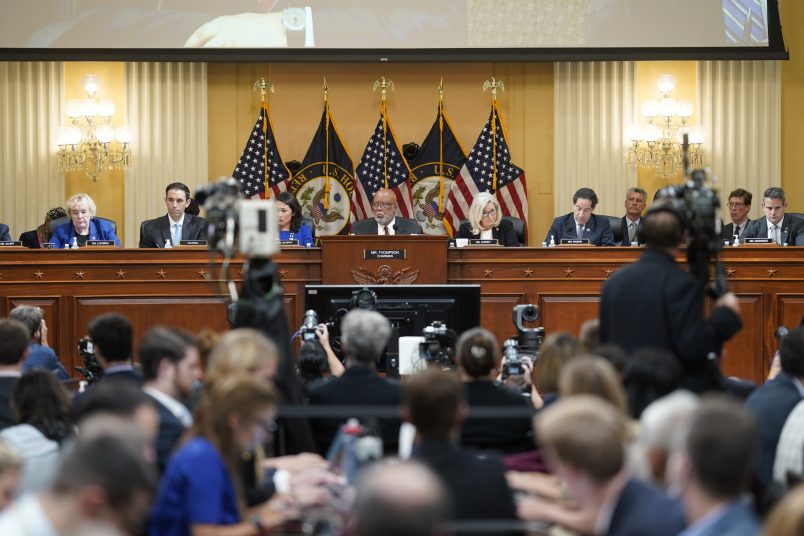This article is part of TPM Cafe, TPM’s home for opinion and news analysis.
As the House Select Committee investigating Jan. 6 prepares for another round of public hearings, coverage has begun to re-emphasize a supposed rift between the congressional inquiry and the Justice Department’s widening criminal investigations. Pay it no mind.
While it drives compelling copy, a sprawling plot to overturn the will of the voters and destroy American democracy investigated by two different branches of government takes time. The framers of our constitution did not design the most efficient government, but they anticipated different branches of government working on common problems in different ways and at different speeds.
What is actually happening is the churning convergence of a mountain of incriminating evidence from multiple investigations that connects former President Donald Trump and a number of his allies to the Jan. 6 attack on the U.S. Capitol in an effort to overturn an election. Soon to join this admixture of evidence is a set of legislative and policy recommendations that might help prevent another assault on our constitutional order.
With the American system of government at stake, citizens should resist being distracted from what matters most now: justice, accountability, and strengthening our democracy.
The evidence to date points toward significant criminal liability for Trump and some of his closest associates, including lawyers Rudy Giuliani, John Eastman, and Jeffrey Clark. The Justice Department is reportedly actively investigating the conspiracy to use false slates of electors in battleground states to try to obstruct the electoral count, as well as efforts to utilize the institution of the Department of Justice to interfere in the election outcomes in Georgia and elsewhere. The Department of Justice and FBI now appear to be following the lead of the committee in some respects, and in other ways going out in front in an effort toward “holding all Jan. 6 perpetrators, at any level, accountable under law whether they were present that day or were otherwise criminally responsible for the assault on our democracy,” in the words of Attorney General Merrick Garland.
Trump is not above the law he swore to uphold. The rule of law is, of course, the basis of our democracy. It is also, according to Garland, “fragile,” demanding “constant effort and vigilance.”
Allies of the former president seek to dismiss the investigations as the product of political vendettas or a scheme to drum up polarization, but these distractions don’t change one simple fact: Trump is not above the law he swore to uphold. The rule of law is, of course, the basis of our democracy. It is also, according to Garland, “fragile,” demanding “constant effort and vigilance.”
While Trump’s lies have apparently embroiled him in more legally jeopardy (see: top-secret government documents allegedly taken and stored at Trump’s Palm Beach club Mar-a-Lago) his lies to overturn the 2020 election fueled the passage of restrictive voting laws at the state level that threaten to make casting a ballot, and having confidence it will be counted, much harder. These lies seeded a crop of candidates now running to oversee future elections on a platform of Trump’s false claims, vowing to fix future elections in their own favor. And they continue to feed a dreadful spike in violent threats toward election workers, pushing generations of election know-how from the job and casting fear over many of those who remain — while diminishing faith in democracy along the way.
These antagonists of democracy have also aimed their lies at the select committee’s work, knowing full well the legal and political exposure many face from a forthright and fulsome telling of the Jan. 6 narrative. The select committee’s return to the public spotlight is likely to drive even more desperate lies in an attempt to distract from the truth.
There’s obviously a lot to keep track of, and a lot of moving pieces — in other words, fertile ground for disinformation. To help make sense of the full factual narrative disclosed thus far by the select committee, the likely paths forward, the resources necessary to understand how our system was exploited, how to prevent a recurrence — and to avoid getting distracted by the noise or disinformation — we assembled a “Citizens Guide to January 6th and Ongoing Threats to Democracy.”
Along with another round of public hearings, the select committee is preparing recommendations for addressing gaps and ambiguities in existing laws governing, among other things, elections and troop deployments on U.S. soil. It is also preparing policy recommendations for various government agencies, likely including the Federal Election Commission as well as the Department of Homeland Security. Two members of the select committee have recently introduced a bill in the House to update the more than century old Electoral Count Act; a similar effort is moving forward in the Senate.
When the select committee issues its “final report,” likely no earlier than November, it will trigger the 30-day closing period that formally ends its operations under its authorizing statute. It will then be up to prosecutors, policymakers, and voters to appreciate the full scope of evidence presented — and work to assure that we avoid a repeat of the unprecedented attack on American democracy that culminated on January 6, 2021.
While the plot to overthrow American democracy took months to plan and execute, investigations into the alleged crimes and accountability for those responsible is likely to take even longer. But that does not mean accountability is not coming. In the meantime, it is vital that all citizens understand what was nearly lost on Jan. 6, 2021, and how we can strengthen our democracy to prevent a repeat of that bloody day.






